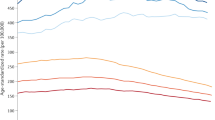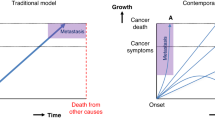Abstract
The word cancer produces widely differing perceptions between the general public, and the scientific and medical communities. These different ideas lead to very diverse understandings of the disease. The paradigms affect both the focus and design of research and also impact upon patient care. The cultural perception is very pessimistic: a relentless, incurable, extremely painful disease, the treatment of which is conceived as difficult, with little chance of a simple cure. Within the medical and scientific communities, however, there are a number of quite different views of the disease. Both the orderly extension of disease described by Halsted, and the systemic nature of cancer even when it appears to be localized, are perceptions within the professional community. The promise of a 'magic bullet' is in sharp contrast to the incremental advances seen in clinical oncology. What is needed is a clear recognition of how these varying perceptions of cancer affect and limit communication among the cancer-related disciplines as well as between these disciplines and the public. Both professionals and the general public should consider cancer as a group of diseases for which cure is related to tumor type, stage and available treatment.
This is a preview of subscription content, access via your institution
Access options
Subscribe to this journal
Receive 12 print issues and online access
$209.00 per year
only $17.42 per issue
Buy this article
- Purchase on Springer Link
- Instant access to full article PDF
Prices may be subject to local taxes which are calculated during checkout
Similar content being viewed by others
References
Sontag S (1990) Illness as Metaphor and AIDS and its Metaphors. New York: Picador, Farrar Straus and Giroux
Solzhenitsyn A (1969) The Cancer Ward. New York: Farrar Straus and Giroux
Auden WH (1940) Collected Poems by WH Auden (Ed Mendelson E) New York: Random House
Halsted WS (1907) The results of radical operations for cure of carcinoma of the breast. Ann Surg 46: 1–19
Haagensen CD (1986) Diseases of the Breast, edn 3. Philadelphia: WB Saunders
McWhirter R (1955) Simple mastectomy and radiotherapy in treatment of breast cancer. Br J Radiol 28: 128–139
Keynes G (1954) Carcinoma of the breast, the unorthodox view. Proc Cardiff Med Soc 40
Fitzwilliams DCL (1940) A plea for a more local operation in really early breast cancer. BMJ 2: 405–408
Hellman S (1993) Dogma and inquisition in medicine. Cancer 71: 2430–2433
Hellman S (1994) The natural history of small breast cancers: the David A Karnovsky Memorial Lecture. J Clin Oncol 12: 2229–2234
Rosenbaum EH and Rosenbaum I (1998) Cancer Supportive Care. Toronto: Somerville House
Jemal A et al. (2005) Cancer statistics 2005. CA Cancer J Clin 55: 10–30
Jolesz FA and Hynynen KH (2005) Focused ultrasound in cancer. In Principles and Practice of Oncology, edn 7, 2883–2890 (Eds DeVita VT et al.) Philadelphia: Lippincott Williams and Wilkins
Author information
Authors and Affiliations
Ethics declarations
Competing interests
The author declares no competing financial interests.
Rights and permissions
About this article
Cite this article
Hellman, S. Evolving paradigms and perceptions of cancer. Nat Rev Clin Oncol 2, 618–624 (2005). https://doi.org/10.1038/ncponc0377
Received:
Accepted:
Issue Date:
DOI: https://doi.org/10.1038/ncponc0377
This article is cited by
-
Is it time to change the stereotype of cancer: the expert view
Cancer Causes & Control (2011)



